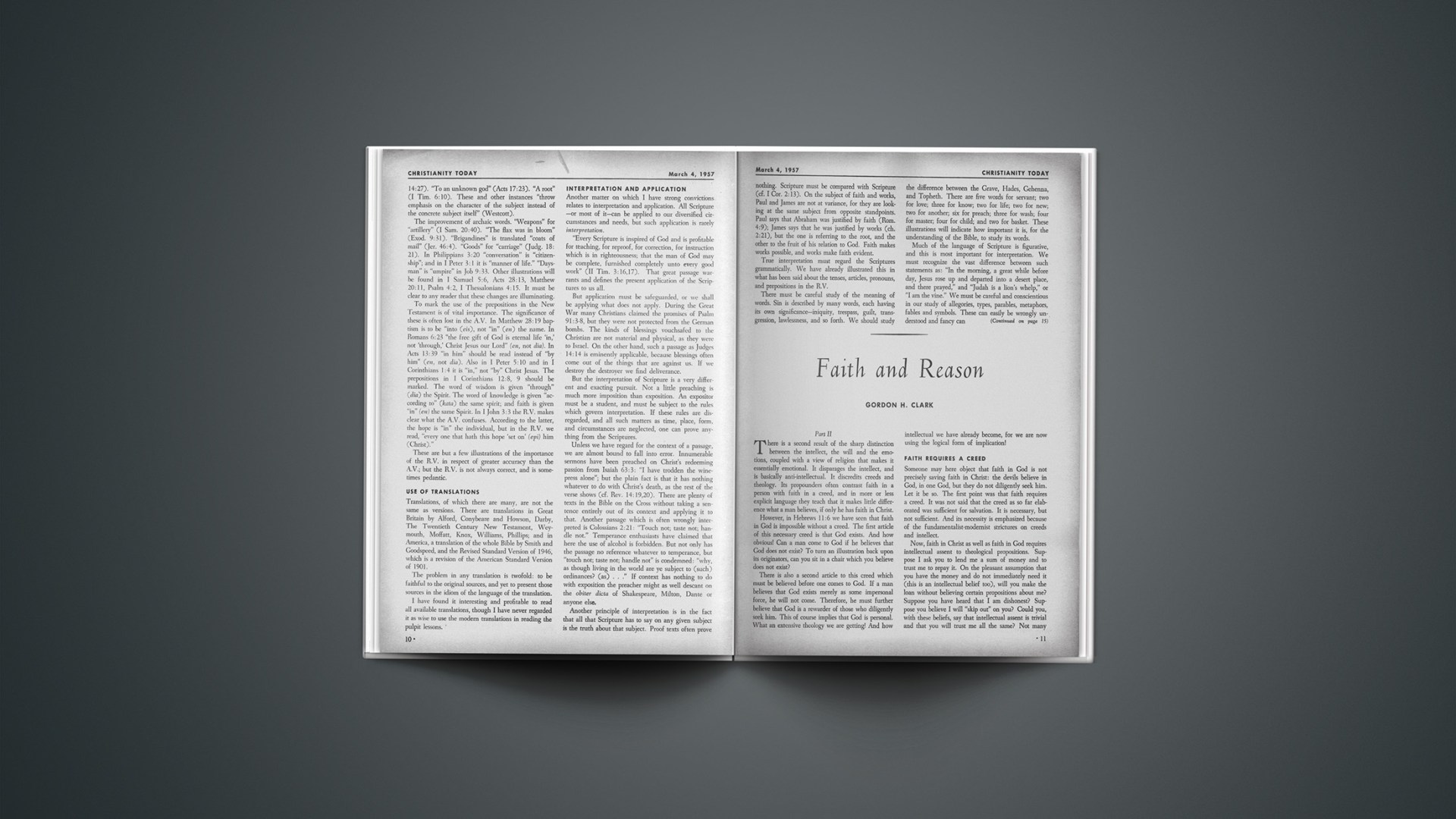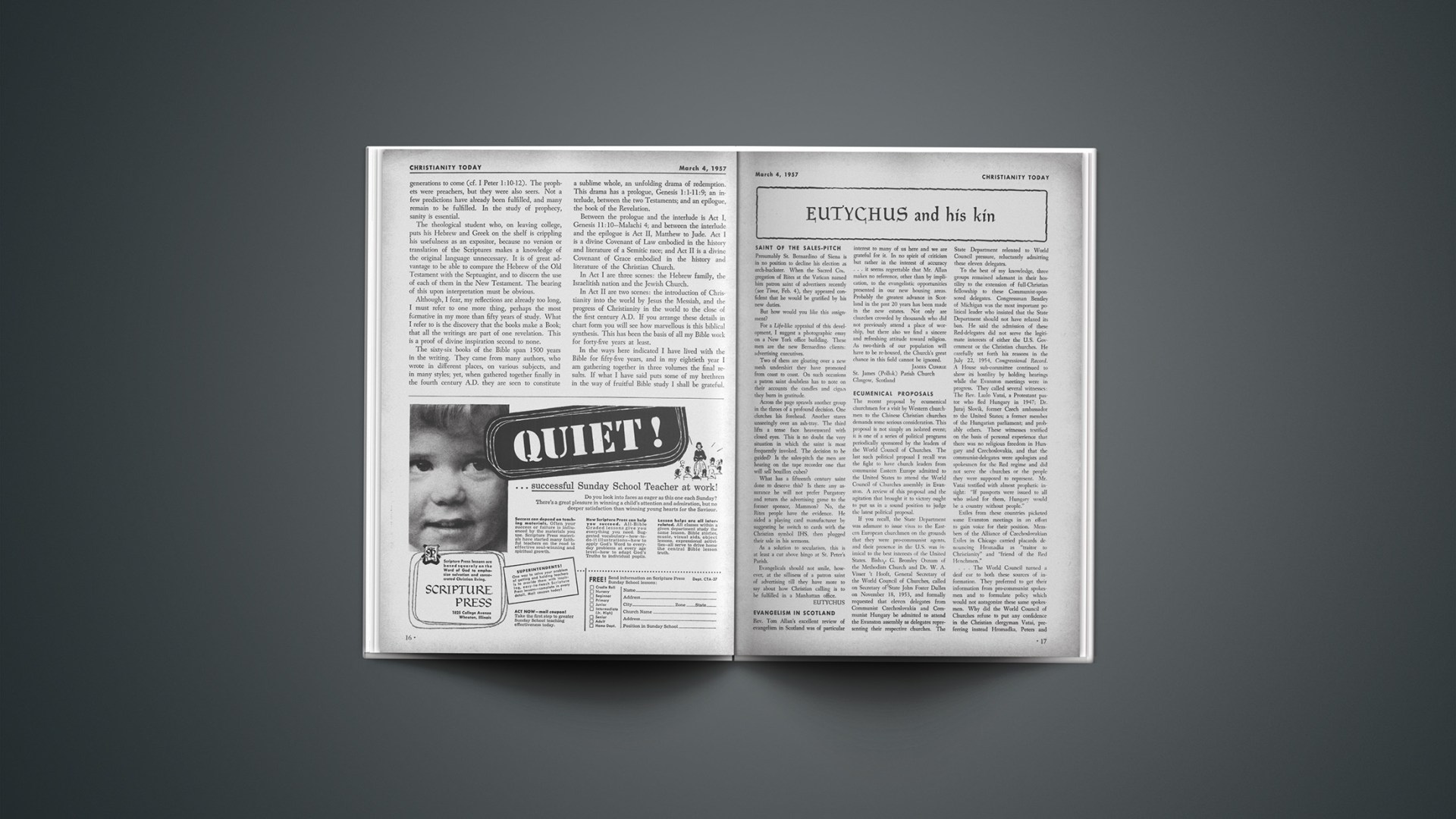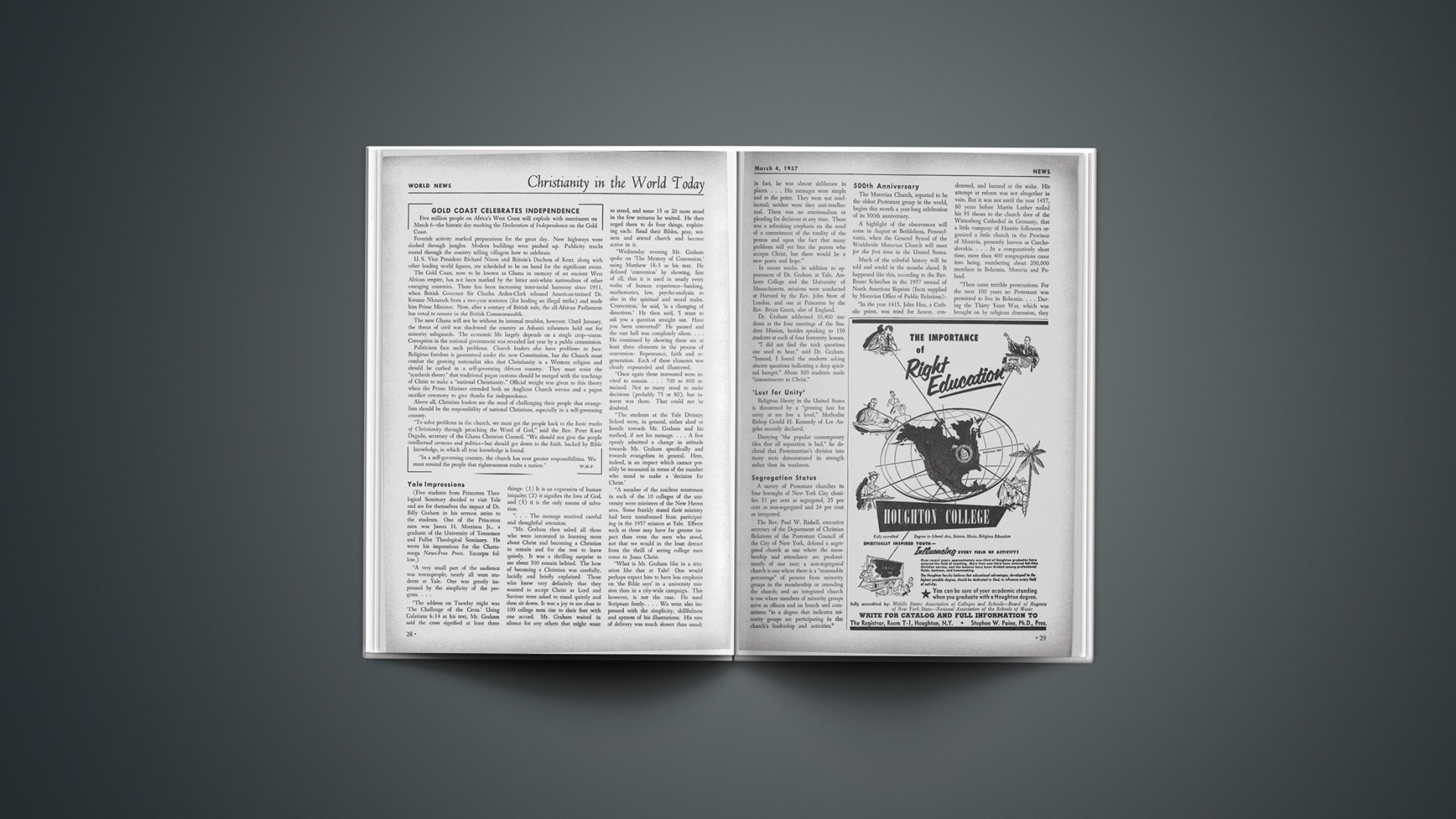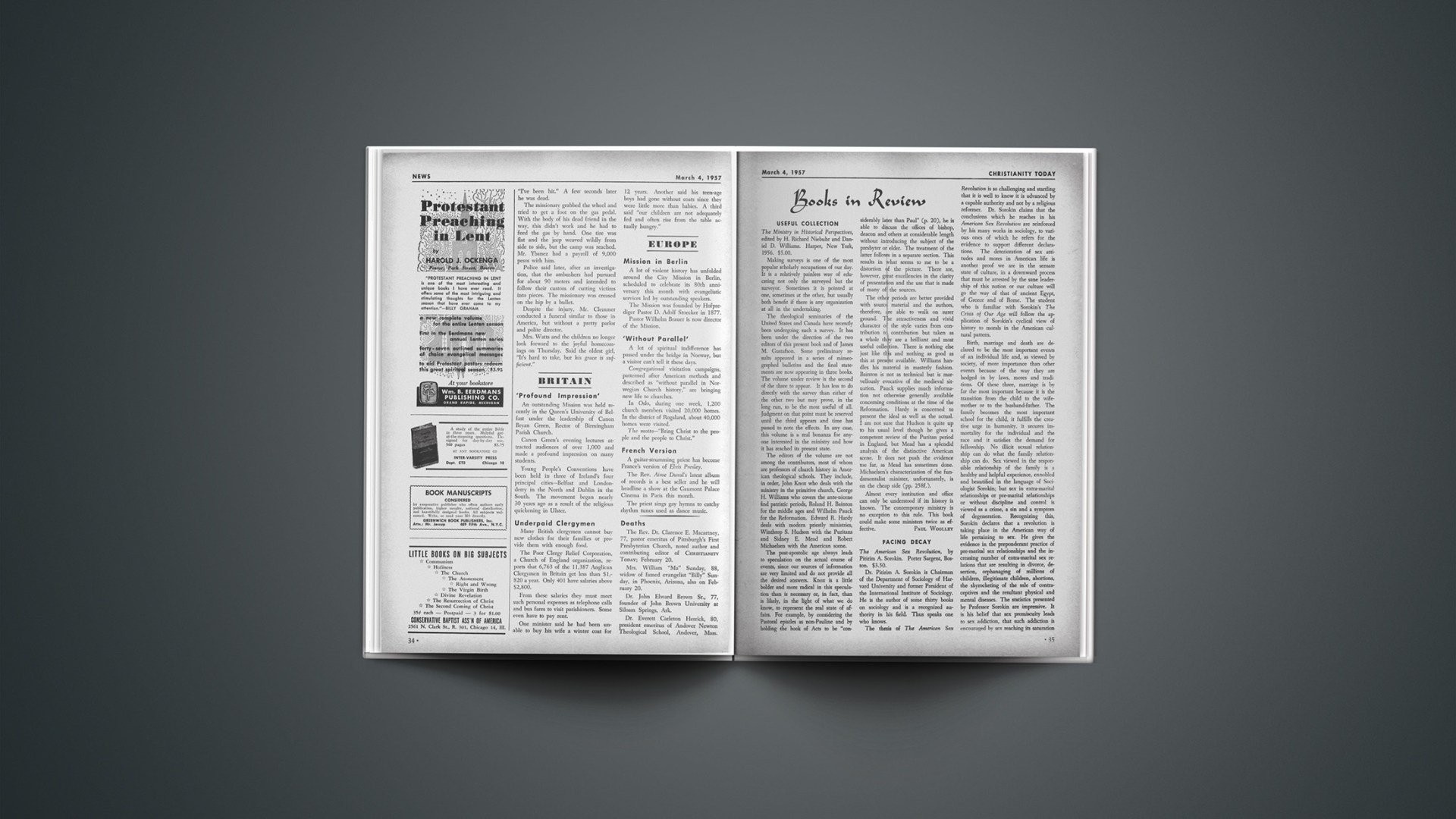There is a second result of the sharp distinction between the intellect, the will and the emotions, coupled with a view of religion that makes it essentially emotional. It disparages the intellect, and is basically anti-intellectual. It discredits creeds and theology. Its propounders often contrast faith in a person with faith in a creed, and in more or less explicit language they teach that it makes little difference what a man believes, if only he has faith in Christ.
However, in Hebrews 11:6 we have seen that faith in God is impossible without a creed. The first article of this necessary creed is that God exists. And how obvious! Can a man come to God if he believes that God does not exist? To turn an illustration back upon its originators, can you sit in a chair which you believe does not exist?
There is also a second article to this creed which must be believed before one comes to God. If a man believes that God exists merely as some impersonal force, he will not come. Therefore, he must further believe that God is a rewarder of those who diligently seek him. This of course implies that God is personal. What an extensive theology we are getting! And how intellectual we have already become, for we are now using the logical form of implication!
Faith Requires A Creed
Someone may here object that faith in God is not precisely saving faith in Christ: the devils believe in God, in one God, but they do not diligently seek him. Let it be so. The first point was that faith requires a creed. It was not said that the creed as so far elaborated was sufficient for salvation. It is necessary, but not sufficient. And its necessity is emphasized because of the fundamentalist-modernist strictures on creeds and intellect.
Now, faith in Christ as well as faith in God requires intellectual assent to theological propositions. Suppose I ask you to lend me a sum of money and to trust me to repay it. On the pleasant assumption that you have the money and do not immediately need it (this is an intellectual belief too), will you make the loan without believing certain propositions about me? Suppose you have heard that I am dishonest? Suppose you believe I will “skip out” on you? Could you, with these beliefs, say that intellectual assent is trivial and that you will trust me all the same? Not many people are so stupid in business affairs. This stupidity is reserved for nonintellectual, emotional religion. It is said of religion that the heart is important but not the head. But if this were true, we could trust Christ for salvation without believing that he is trustworthy, without believing that he can save, without believing that his blood cleanses from all sin. We would need no creed, no statement of the Atonement, no historical information about Jesus; we would need only a comfortable feeling around the heart.
Although there have been mystics and assorted anti-intellectuals in every age, the main current of Christianity has always been intellectualistic. Creeds or statements of belief have not been abandoned. There has always been some recognition of the primacy of the intellect.
At any rate the Protestant, especially the Reformed, position is clear. Calvin (Institutes, Book I, ch. XV, Sec. 6–8), after he summarizes some philosophical analyses of the soul’s faculties and indicates that they are plausible but far from certain, particularly because the philosophers ignored the depravity of human nature due to sin, proposes a twofold, not a threefold, division of the soul: understanding and will. Understanding, he says, discriminates between objects; the will chooses what the understanding pronounces good. The understanding is the guide and governor of the soul; the will always respects its authority and waits for its judgment. And there is no power in the soul other than these two. Charles Hodge, also speaking of man before the fall (Systematic Theology, Vol. II, p. 99), says, “His reason was subject to God; his will was subject to his reason.”
And finally, J. Gresham Machen (What Is Faith? p. 26; cf. pp. 49, 51) states that “it will be one chief purpose of the present little book to defend the primacy of the intellect.” Later he adds: “That does not mean that we finite creatures can find out God by our own searching; but it does mean that God has made us capable of receiving the information which he chooses to give.… So our reason is certainly insufficient to tell us about God unless he reveals himself; but it is capable (or would be capable if it were not clouded by sin) of receiving revelation when once it is given” (ibid., p. 51).
A Protestant Position
The proper Protestant position might be summarized somewhat as follows. An act of will, that is, the activity of a person in choosing something, and an act of intellect, that is, the activity of a person in believing something, if they are regarded solely as the clanking of so much mental machinery, are neither one superior to the other. Their differences in value, merit or superiority depend entirely on their objects. In making a purchase it is the object bought that makes the activity worthwhile or foolish. So it is the object chosen and the proposition believed that give value to the will and the intellect. Now, in the case of will, we may choose to eat ice cream or we may choose to believe in the Republican party; but in the case of intellect, by definition, the object is always a truth or an alleged truth.
It may be granted that the single act of will by which we choose to worship God is of superior value to the single intellectual action of believing in the Republican party. But inasmuch as the proper object of intellectual action is always the truth (though often we sinfully believe lies), whereas food, recreation and sleep are perfectly proper objects of choice, it may be concluded that in its nature the intellectual act is superior to the volitional act.
The Priority Of Truth
The primacy of the intellect therefore could well be called the primacy of truth. This does not mean, as Machen has already said, that we can discover the truth about God apart from revelation; nor does it mean that man in his mind is immune to the effects of sin; but it does mean that man’s mind is not totally destroyed by sin and that even yet it is constitutionally capable of receiving, understanding and believing information that God reveals.
Neither is the claim here made that the intellect invariably dominates the will. Calvin indeed said that it is the office of the will to choose what the understanding shall have pronounced to be good and that the will always respects its authority (Institutes, Book I, ch. xv, Sec. 7). But Calvin did not discuss voluntary assent to the truth. In such cases the will leads and the intellect follows. And a study of the history of philosophy may well indicate that this is far more frequent than ordinarily supposed.
The primacy of the intellect, then, is not a power automatically exercised over our volition. Such a representation tends to violate the unity of the person. Rather, the primacy of the intellect, or, better, the primacy of truth, means that our voluntary actions ought to be conformed to truth. If it is true that worshipping God is good, we ought to worship him. This way of putting the matter extends as well to the voluntary choice of belief. We may choose to believe a truth, or we may choose to believe a lie. Both types of choice actually occur. But the primacy of truth means that we ought to believe the truth and we ought not to believe the lie.
In conclusion, now, the implication of this primacy for Christianity will be drawn by means of one example and one generalization.
A minister of fundamentalist persuasion and evangelistic zeal asserted that there is little hope of understanding the Bible. Theology is abstruse and doubtful. However, God has given his people the power of discerning the hearts of men, and with this power a minister can decide who should and who should not be admitted to church membership. In the confused and confusing discussion that followed, Romans 10:9–10 made its appearance. At first, in the rapid exchange of ideas, the minister was inclined to agree that anyone satisfying the conditions of that passage was a saved person. But when it was pointed out to him that belief in Christ’s resurrection was a belief about history, an intellectual acceptance of an historical proposition, he quickly corrected himself and denied that belief in Christ’s resurrection entails salvation. Salvation, he asserted, is not a matter of belief at all.
The generalization that was to follow this example must be introduced with a reference to modernism and neo-orthodoxy. For although these forms of religion have scant sympathy for fundamentalism, yet all three forms of religion are in a strange but substantial agreement. The agreement consists in their anti-intellectualism. If the two modern forms allow any intellectual expression at all, if they make any room for doctrine, they regard it sometimes as a tentative formulation which in a later age may be replaced by its contradiction. Thus the exponents of modernism have condescendingly granted that the Nicene Creed was well and good, and even true enough, for the fourth century, and that the Westminster Confession satisfied the needs of the seventeenth; but the twentieth century cannot accept these outmoded formulas. And the neo-orthodox claim that the Nicene Creed, the Westminster Confession and the formally contradictory writings of Fosdick or Brunner as well are all merely symbolic, metaphorical, mythological expressions of a single ineffable experience. Being ineffable, it cannot be expressed in words. Since therefore all words are equally futile, it makes little difference what words we use symbolically in our attempt to express the inexpressible.
But this is not Christianity. Christianity includes the primacy of the intellect and the sovereign claims of truth. There is no distinction between the head and the heart, no depretiation of intellectual belief. Christianity cannot exist without the truth of certain definite historical propositions.
To deny the truth of such propositions or to call them symbols of some mystic experience is not Christianity. On the contrary, by faith we understand that God created the universe; by faith we assent to the proposition that God is a rewarder of those that diligently seek him; by faith we know that Jesus rose from the dead. If these propositions are not true, and if truth has no claim upon our acceptance, let us not hypocritically say that Christianity is worth propagating.











